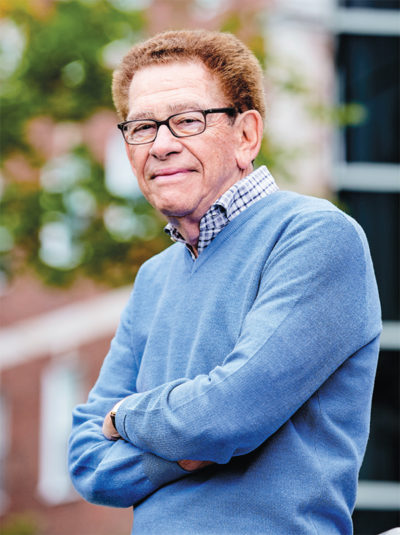
Senior Lecturer Ed Marram
Photo: Michael Quiet
Ed Marram isn’t just interested in helping students become successful entrepreneurs. He wants them to make a difference in the world.
After a successful scientific career that led him to found and grow his own business, Marram, a senior lecturer in entrepreneurship, made time to study under Professors Neal Churchill and Bill Bygrave at Babson until he felt ready to teach. He has been a faculty member in the Entrepreneurial program for more than 30 years, starting as an adjunct lecturer, then joining the full-time faculty after he sold his business in 2005.
Marram teaches Managing Growing Businesses, a graduate-level course designed to provide insight into the challenges and opportunities of growing an entrepreneurial company, and a number of executive education courses. He has taught students from all around the world, both at Babson and in their home countries. Some of those relationships have become long-term commitments. For example, Ulster University in Northern Ireland, started coming to Babson about 12 years ago to learn about entrepreneurship. Last year, Ulster awarded Marram with an honorary doctorate.
“I’m surprised by how much knowledge and interest my students have,” Marram says. “All of them want to be entrepreneurs—and all want to know how to better run a business.” But his students’ focus isn’t just on the bottom line, he notes. Many are creating socially responsible businesses. “It’s not just about making money,” he says. “It’s about doing good for people and the environment.”
For example, one of Marram’s students provides microloans to poor women in Mexico. “A small loan doesn’t change their socioeconomic status, but it does make a huge difference in their individual lives,” Marram says.
Marram brings a wealth of entrepreneurial knowledge to Babson. He owned Geo-Centers Inc., a high-technology, professional services firm, for more than 35 years, growing the business to a staff of 1,400 people and $200 million in revenue. The firm was recognized twice by Inc. magazine as one of the fastest-growing, privately held companies in the United States. That background, he notes, brings “broad, real-life experience—and real-life problems—to the classroom.”
Beyond his work at Babson, Marram has served on the boards of several privately held companies and at institutions of higher education. He is a member of the National Association of Corporate Directors, and he previously served on the Health and Educational Financial Authority of Massachusetts.
Marram speaks with pride about the learning experience at Babson. “The unique thing about (the College) is that it has practitioners like me teaching entrepreneurship,” he says. “What better enrichment can you have than people who have actually experienced and survived the issues companies face?” – Amy Davis
]]>That meant she’d need to learn how to pitch to potential investors, something out of her wheelhouse. Jaffar knew this process wouldn’t be painless. There would be tough questions. And challenges. And more questions. Lots of questions.
“We had to do it,” she says of the practice pitch sessions done during the Summer Venture Program, a business accelerator that’s part of The Arthur M. Blank Center for Entrepreneurship. “We needed to feel uncomfortable, and we needed to be OK with that feeling, because this is going to happen—this is going to be real.”
That experience allowed Jaffar to up her game—and her self-assurance. “I realized,” she says, “that people could look at me and say, ‘She’s good, we want to give her a chance.’”
The business world doesn’t always offer men and women a level playing field when it comes to starting an entrepreneurial venture. Women who want to start companies or take their entrepreneurial mindset to startup or corporate executive roles may face daunting challenges. They are often passed over as leaders, denied representation in C-suites, challenged on their knowledge and skills, find it considerably more difficult than men to secure funding for new businesses, and lack established networks that can help them succeed.
But women like Jaffar are finding that they can gain a decided advantage with a solid business education, undergraduate and graduate, that emphasizes entrepreneurship and experiential learning. That type of education happens in the classroom and via programs offering coaching and mentoring, plus guidance in building essential networks. In Jaffar’s case, her pitch for an eponymous modest and fashionable clothing line earned her a finalist spot in the Blank Center’s B.E.T.A. (Babson Entrepreneurial Thought & Action®) Challenge, which celebrates entrepreneurs who are bringing their business ideas to life. She also was given support from the Babson Seed Fund and received the Sorenson Scholarship Award for Meritorious Achievement. Jaffar was awarded the Female Founder Impact Award from the Center for Women’s Entrepreneurial Leadership (CWEL), one of few business school centers in the country that focuses on women. After graduation, Jaffar moved to New York, where she is working full time on her venture, and “continuing the road that Babson paved for me.”
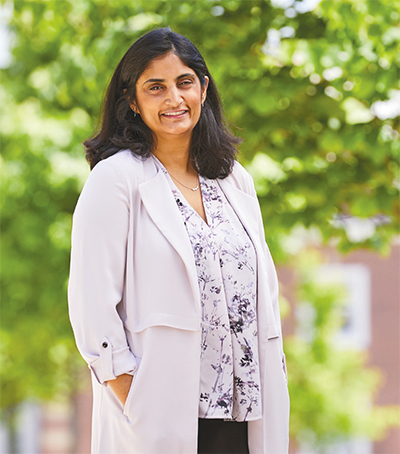
Lakshmi Balachandra, assistant professor of entrepreneurship
Photo: Pat Piasecki
For any industry, “the more knowledge and prep you have, the better,” says Lakshmi Balachandra, an assistant professor of entrepreneurship who teaches Foundations of Management and Entrepreneurship, a required first-year course where students work in teams to build, launch, and run an actual business. Similarly, Babson’s Management Consulting Field Experience (MCFE) pairs Boston-area companies with student teams who work as consultants on actual business challenges.
“When you come to an entrepreneurship class,” Balachandra says, “you learn about the foundations of building a business plan, and how to prepare the financials the way investors want to see them. Having that educational component gives you a huge leg up.”
But the most important component, she adds, may be learning how to work with other people: “How do you lead, how do you communicate with investors, how do you manage all these moving parts?” That students are thrown into these situations from day one makes the program unique, and offers women opportunities they may not get in the real world, especially starting out. Balachandra adds that she has seen more women pursuing and attaining leadership roles in the class, “and that has been incredibly exciting.”
From Mentee to Mentor
“I don’t think you can go into entrepreneurship without thinking it will be hard,” says Mackenzie Page ’20. Choosing entrepreneurship factored into her becoming a CWEL Scholar, which not only provided a partial scholarship, but also tremendous opportunities for working with a mentor, becoming a mentor, and creating a network of like-minded women.
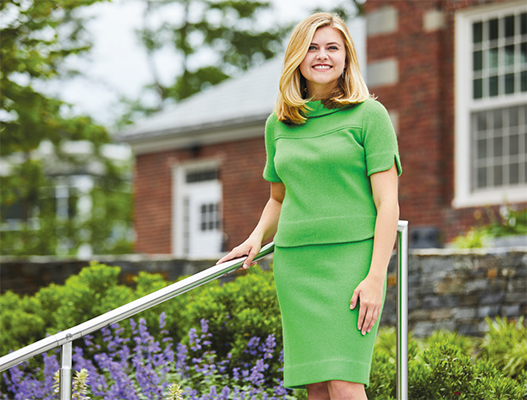
Mackenzie Page ’20, a CWEL Scholar
Photo: Pat Piasecki
Page’s CWEL experiences have been profound. “When I first came to Babson, I had a really great peer mentor,” she says. “She was excellent in showing us how strong we could be, how much we could embrace—she was a great role model, and this was my first glimpse into what a mentorship can be.”
Taking part in CWEL networking sessions has allowed Page to feel comfortable approaching complete strangers in business-social settings, which can be daunting for some. “It has really lifted my confidence,” she says. In her first-year FME class, she was a co-CEO with a male classmate, and learned how creative problem solving could tackle tough challenges. In her second year, she became an FME mentor to first-year students, which she calls “a fantastic experience.”
Changing the System
Make no mistake—educational programs that help women become entrepreneurs are no indication that women’s skills and abilities are inferior to those of men.
“The solution to challenges women face in starting and growing businesses is not just to educate, train, or fix the women” says Candida Brush, vice provost of global entrepreneurial leadership and the F.W. Olin Distinguished Professor of Entrepreneurship. Rather, the system needs to change. A male-dominated finance industry, for example, needs to recognize that women-owned businesses are worthy of investing.
“One of the reasons why Babson’s WIN (Women Innovating Now) Lab® was created,” she adds, “was because women were being left out of highly competitive venture accelerators. The education and mentoring that the WIN Lab provides is the same support available in other accelerators.” The WIN Lab, which is part of CWEL and found at Babson’s Boston and Miami campuses, allows women to expand their ventures by testing and tweaking their ideas. Women also have access to experts in various fields, and opportunities to showcase their company and be coached on how to pitch.
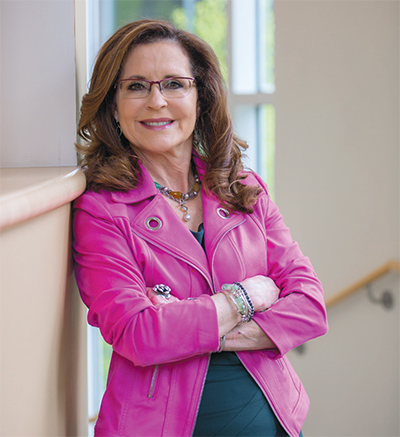
Susan Duffy, executive director of CWEL
Photo: Dan Vaillancourt
Susan Duffy, CWEL’s executive director, says the center adds to the “already exceptional functional education that Babson is providing. This center is about building that successful entrepreneurial leader and giving them the tools they need to identify opportunities and overcome challenges that may arise as they navigate their careers.” Combining mentorship, leadership acumen, networking, and immersive learning experiences, she adds, “CWEL emphasizes business skills, while creating opportunities for emerging women leaders to build their self-efficacy— something that research tells us is vital to success.”
At her summer internship working in data operations and analytics for an insurance group, Page already can see the benefits of what she has learned, including presentation skills she has drawn on for her job. “In FME, you have to do presentations throughout the year, and that helps you build up your confidence,” she says. “Early on at Babson, it was quite apparent to me what the College was preparing me for. Like most people I’m nervous on my first day of a new job, but it’s great to remind yourself that you have tons of classwork and experience under your belt.”
]]>Last year, I launched BikeLord, an online marketplace for buying and selling used bicycles, as a mobile app. However, after launch, it just sat there on the app store. A handful of people downloaded it every week, but no one was buying bikes. I realized that the majority of users were actually interacting with our website, which at the time was significantly less developed than the mobile app. With this in mind, my team refocused our efforts to build a better web experience. BikeLord started to see users really trust the company, and our conversion rates increased. We have since changed our focus to web first; we’re still working on the app, but this time as a secondary channel. There is often a gap between how you intend people to use your product and how they actually use it. You have to pay attention to customer behavior and adapt accordingly. —Jake Maude, MBA’19, founder, BikeLord
Catching the Wave
From 2003 to 2015, I built a company called BiddingForGood in the charity auction space; it was a kind of “eBay for charities.” Although the mission was laudable (the company is closing in on half a billion dollars raised for worthy causes), the company never really took off from an investor perspective. It was creating value; it’s just that most of it went to the customers. But I was so enamored of the mission that I stayed with it far longer than I should have.
After we sold, I went on sabbatical. At a conference I attended, a speaker said, “For me, startups are all about catching the wave.” In that moment, I knew I had my North Star. I looked for projects where strong market signals suggested a wave. Months later, I met three Harvard students doing $100K monthly out of their dorm room with a virtual college-guidance service. Clearly, they were onto something. Now, three years later, I am CEO of CollegeVine, mentoring a superb founder team and building the largest college advisory company in the U.S. No matter how much you believe in your startup and its mission, it’s still all about catching the wave. —Jon Carson ’79, CEO, CollegeVine
Go, Team
In 2016, I launched a Kickstarter to build an app for my startup, Official Black Wall Street, a guide to black-owned businesses. Four stressful and sleepless weeks followed. Not only was I crowdfunding for the first time, I also had to keep up with being a CEO, CMO, CFO, customer rep, and every other position imaginable; at the same time, my full-time job became more demanding. I was a one-woman show, learning and implementing simultaneously. I exceeded my Kickstarter goal, but things began moving even faster. I had a hard time keeping up, and this delayed development of my app by months.
Realizing that I couldn’t do it all, I reached out to my network and was fortunate enough to find people who were passionate about my mission and willing to help out. Those grueling first months taught me how crucial it is to have a team. So many businesses fail when the owner spends more time working in their business than on their business. —Mandy Bowman ’12, founder, Official Black Wall Street
New Tricks
This past year was all about failing fast. I re-entered the world of startups and emerging businesses, becoming CEO of Jackson Galaxy Enterprises; Jackson Galaxy is a cat behaviorist and host of Animal Planet’s My Cat from Hell (and also my brother). I realized quickly that my experiences and time working for a large global business, though in many ways helpful, did not apply to this structure. I did not have the same support system, meaning I had to plan and execute at the same time. I had to learn about pay-per-click, social media marketing, and film production—areas in which my knowledge was very cursory. It took some time to get my bearings, and it did not come without mistakes and missteps along the way, but I learned from them and changed things fast. Now, our trajectory is up and to the right. It turns out you can teach an old dog (or, for my business, cat) new tricks. —Marc Kurschner ’92, CEO, Jackson Galaxy Enterprises
Hiring and Firing
My biggest learning experience at CarBuckets revolved around my reluctance to let people go when they’re not the right fit. It’s never easy to fire someone, but I sometimes let people stay too long. On a small team, this can completely upset the dynamics. CarBuckets took six years to launch because I brought on people who were not wholeheartedly committed to the product. That lack of commitment manifested itself in many ways, negatively impacting our launch. You need a certain dedication, passion, and pride when working for a startup.
I’m happy to say that I now have a team that feels like family. We are in a good groove with one common goal. My advice to entrepreneurs? When it’s not working, don’t force it. Although it’s hard to fire someone, as CEO you have to worry about the well-being of your entire team and your company. —Alexandra Esteve ’07, founder and CEO, CarBuckets
Lay the Groundwork
I was seeking approval from the credit risk department for a specialized lending program, critical for the growth of my business. This lending program deviated from our usual debt underwriting standards and thus was riskier. I thought I had properly familiarized all the key constituents with the proposal. However, the results said otherwise: We not only failed to get the program approved, the head risk officer raised the bar on requirements for further consideration.
We went back to the drawing board, investing a lot more time understanding the concerns of all parties, redesigning the program, and vetting the proposal, in detail, with each constituent. By the time the proposal was reconsidered, there were no surprises, and it was approved. I learned a valuable lesson: To negotiate successfully you must be deeply knowledgeable and empathetic about all parties’ motivations and present a proposal that addresses their goals as much as yours. —Carolina Jannicelli ’96, managing director, J.P. Morgan
A Proper Teacher
It felt like a sock in the gut. I walked up to the restaurant I was running, and there was a sign on the door that said “Out of Business”—the owners had boarded up the windows and changed the locks overnight. I was stunned. All the hard work, the long hours, the grinding—I had given my life to these restaurants, having opened all four locations, and I took it personally, wondering what I did wrong. After the initial sting faded, I took inventory of all of the things that led to this failure—actions both right and wrong—and vowed to learn as much from it as I could. Today, I operate JJ’s Red Hots, a mini-chain of “hot dog joints,” with the mindset that though things may be going well now, it all could come crashing down at any moment. That’s failure whispering in my ear. It’s powerful and palpable, and it’s always there. But you just keep going. Failure is a proper teacher. —Jonathan Luther ’90, founder, JJ’s Red Hots
Kindness Counts
I have a keepsake in my office from some 45 years ago: a hockey puck given to me by my sixth-grade teacher, Mr. Bubalo. Mr. Bubalo was a dedicated teacher who also kept up with our lives outside the classroom, so he knew I was trying out for the sixth-grade basketball team. Unfortunately, my athletic career to that point had been marked by failures, and my objective was simply to earn a spot on a team. While my hustle and passion were undeniable, my performance was anemic at best. Mr. Bubalo learned that I’d been cut from the team even before I told him, and early one morning he approached my desk, patted my shoulder, and set a hockey puck down before me. “You’ve got options,” he told me.
I wish I could say that I went on to excel at a new sport, but that’s not how the story goes. Instead, what I took away, and what I still try to bear in mind as a teacher, is that all of our students will suffer setbacks. Any kindnesses we show them can resonate, sometimes even for decades. —Stephen Bauer, senior lecturer of English, Babson
Military Strength
In January 1966, I graduated from Wisconsin State University Oshkosh with a degree in economics—a proud moment. However, I also lost my student deferment for the draft. It didn’t take long. I was inducted into the Army on April 4, 1966. Although being drafted during the Vietnam era might have been considered a low point, in retrospect it was a wonderful opportunity. Born and raised in Oshkosh, I had never been farther from home than Detroit. While stationed in Vietnam, I had the opportunity to travel throughout Asia. During my long military career, I traveled all over the world. And the U.S. Army arranged for my attendance at Babson, where I obtained my MBA. Being drafted into the United States Army was not a failure; it proved to be a wonderful opportunity. —Gary Laabs, MBA’75, registered nurse
]]>So when Wilson, who works a day job at a tech startup, was casting about for an entrepreneurial idea, sneakers seemed a natural fit. But not just any sneakers. Artefact NYC makes products for the former sneaker-head who has outgrown tennis shoes and needs sophisticated footwear that moves seamlessly from the workweek to the weekend, says Wilson.
Make no mistake: The company’s signature sneaker, dubbed No. 85, is not meant for the gym. Wilson runs down the details: Italian leathers that get better with age, durable rubber soles, waxed laces, and a sleek, refined profile. He thought he knew a lot about sneakers before embarking on the process, but he soon found out there was quite a bit more to learn. Wilson says, “There were lots of late nights plotting and planning. I definitely know more about leather—nubuck, suede, pigskin, how smooth, how buttery, how durable. I know a ton more about leather.”
He also knows a ton more about launching a startup involving small-batch manufacturing. One of the biggest challenges, he says, was finding a manufacturer who was willing to make shoes in small production runs. To enhance the product’s aura of exclusivity, only about 100 pairs of each color are made—and when they’re gone, they’re gone. Artefact created a special model for curated men’s clothing website Grailed; it sold out quickly and is now in demand on the resale market.
Wilson says the rise of independent fashion brands, with products sold directly to consumers, helped inspire Artefact; such brands, he says, are “having a moment.” But he also gives a tip of the hat, as it were, to Babson: “My education was both practical and inspiring. Babson has a special culture, a motivating culture. I don’t know if that exists anywhere else.”—Jane Dornbusch
]]>A few years ago, Abby Speicher Carroll, MBA’15, was set to present at a business plan competition. Her business, DARTdrones, was a flight school for people learning to pilot drones, those increasingly common flying machines buzzing and soaring about the skies.
At the time of the competition, the company wasn’t much more than a concept and neither Carroll nor her team actually knew how to operate a drone. Regardless, they decided on a whim to order one so they could demonstrate how it flies as part of their presentation.
When the new drone arrived, however, it came with no instructions, or at least, no directions in English. The hour Carroll spent practicing how to fly it proved, in hindsight, to be comically inadequate. During the competition, as the drone lifted into the air, the judges watched eagerly. “They thought I had everything under control,” Carroll says.
That wasn’t exactly true. “It went the opposite way from what I expected,” she says. “It was flying right above the judges. They were scrambling to get away.” Her father, Chris Speicher, who also is a co-founder, tried to grab the drone out of the air. Eventually, it crash landed in front of Carroll, bringing the demonstration to an unceremonious end. “Everybody thought it was hilarious, but I literally still have nightmares about it,” says Carroll.
The entrepreneurial journey is often not a smooth ride, and a hard landing or two is to be expected. Building DARTdrones since that shaky flight, Carroll has experienced uncertainty, stress, and many long hours. But she understands that the startup process is an untidy, exhilarating mess, and she has come to thrive on it. “I love chaos. I love flux. If it’s not in flux, I make it in flux,” she says. “With any company, there are endless problems. This is how business is. You have to deal with it.”
Not that she has experienced only problems. There also have been triumphs, including an appearance on the TV show Shark Tank, and she relishes that DARTdrones is a family affair, with both her father and husband on board. Today, the venture offers training in 40 cities across the U.S., with instructors who have military and commercial flying expertise, and organizations are turning to DARTdrones to understand a technology that’s poised to become a ubiquitous part of our future.
On the Hunt
For years, drones were the purview of the military. Any civilian use seemed limited to hobbyists fooling around with drones in a park. That’s changing. Earlier this year, the Federal Aviation Administration announced that more than 1 million drones had been registered with the agency. Drones have been used to watch whales and document volcanic eruptions, to survey flood damage and find survivors after natural disasters, to check insurance claims and inspect power lines. UPS is testing delivery trucks outfitted with drones, and images taken by drones are common in movies and news broadcasts.
“There are endless possibilities,” says Colin Romberger, chief pilot and operations consultant at DARTdrones. “At this point, it is a wide-open canvas.” DARTdrones is well-suited to help companies figure out these many capabilities, but keeping up with the evolving industry and its steady changes in technology and regulation isn’t easy. Mike McCann, enterprise account manager at DARTdrones, gives credit to the forward-thinking Carroll. “She has got to be a year ahead, knowing what’s coming,” McCann says. “She is really on top of things. Abby amazes me.”
Carroll developed the concept for DARTdrones during her first year at Babson. She had come to the College determined to pursue an entrepreneurial venture—she just needed to figure out what that would be. It was a busy time. She had to contend with schoolwork, a graduate assistantship, and, to make ends meet, four babysitting gigs. True to her affinity for chaos, she also adopted a dog.
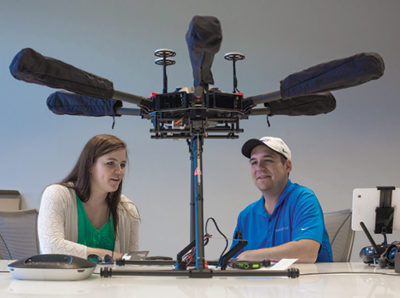
Abby Speicher Carroll and Colin Romberger, chief pilot and operations consultant at DARTdrones, examine a drone from a client.
Her studio apartment in Newton, Massachusetts, which she shared with future husband Mike Carroll, was crammed with paraphernalia, including a prototype for a baby pacifier designed to stayed attached to an infant’s face, equipment and ingredients for making mead and starting a meadery, and a snowboard training device about the size of a table. In all, she was pondering about 20 business ideas. “I was on the hunt,” she says. “I get excited about opportunities, and I can’t resist them.”
Carroll’s intensity isn’t surprising. Growing up in Dunmore, Pennsylvania, a small town near Scranton in the northeastern part of the state, she comes from a family of entrepreneurs. Her grandfather began a food brokerage when he was laid off from the A&P grocery chain, and her grandmother was district sales manager for Avon, supervising some 200 entrepreneurial women selling beauty products. Through the years, Carroll’s father has played various roles in about 30 startups and is now an entrepreneurship professor.
Whether in the classroom or in the many sports she played, Carroll had tenacity as a child, says her father. “She was always persistent,” Speicher says. “She always had that drive.” At 17, Carroll started her first business, a social enterprise that sold purses handmade by women in Ghana. She was inspired to launch the venture after accompanying her father on a trip to the country, and a portion of the profits went to fund children’s education there. For five years, Carroll worked on the business before finally deciding to move on, passing it along to a family friend to run, and the venture is still in operation today.
Carroll’s father also had a hand in the start of DARTdrones. As she debated what type of business to start at Babson, Speicher nudged her toward drones. Growing excited about the aircraft’s commercial potential, Speicher was fascinated when Amazon’s Jeff Bezos went on 60 Minutes in 2013 and demonstrated how a drone could deliver a package. “This is coming on,” Speicher would tell Carroll. “This is going to take over.” In time, she came to agree that drones could be a great business. But shaping and growing that business would be a long, trying process.
Frustration and Inspiration
Carroll began working on DARTdrones in early 2014. Soon enough, doubts followed.
As many entrepreneurs do when launching a business, Carroll first focused on market research. She identified potential competitors and customers, but the work felt unproductive. “Everything was so theoretical,” she says. “I would call people, asking, ‘What are your feelings toward drones?’” The months slipped by. No customers were in sight. By the fall, her classmates were looking ahead to graduation and applying for jobs, but Carroll was tethered to a far-from-solid business concept. “I was nervous,” she says. “DARTdrones was just fluttering around. I can see why people quit at that point.”
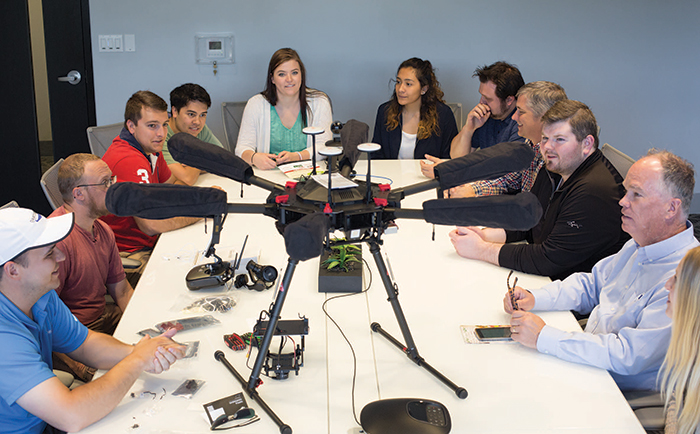
Abby Speicher Carroll and the staff at the DARTdrones office in Jessup, Pennsylvania, gather for a meeting.
Carroll decided to give herself till the winter break to decide whether to continue the business. But then her dad began pressing her with another idea. Why not sell drones, he proposed. The holiday season was coming, and a family friend was willing to invest $50,000. They could order a shipment of drones and then resell them. Drones promised to be a hot holiday gift.
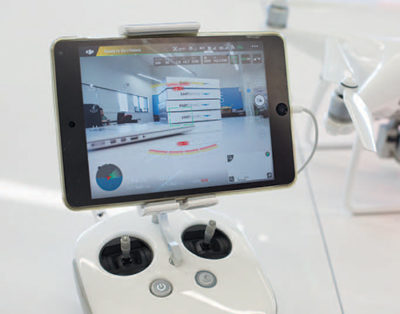
A controller for piloting a drone comes with a video screen that displays the aircraft’s surroundings.
While DARTdrones was envisioned originally as more of an all-encompassing company, one that would sell drones as well as offer instructional support, Carroll had long since decided that a focus on training was the way to go, particularly after her scary flight at the business competition demonstrated the need for such courses. Despite misgivings, she went along with her father’s idea. The hope was that their shipment of drones would come in by Black Friday, which would leave plenty of time to resell them.
That seemingly solid plan went awry, however, as the drones didn’t arrive until after Christmas. “We were stuck with all these drones,” says Carroll. “It was horrible.” Though she was able to sell some in the ensuing weeks, she admits that a bunch of unsold drones, their technology now outdated, are sitting in her parents’ home.
After that fiasco, Carroll was filled with frustration. But she soon had a flash of inspiration that would turn the business around. As someone who follows the industry, she saw that DJI, a leading drone manufacturer, was offering free demos. Carroll had a thought: What if DARTdrones piggybacked on the demos to attract customers? Partnering with DJI, DARTdrones began hosting events throughout the Northeast, presenting DJI’s two-hour demo and then offering a free DARTdrones training session. DARTdrones was able to interact with customers, receive feedback on its course, and spread the word about the company.
Sales took off, and, suddenly, the uncertainty of 2014 gave way to excitement in 2015. In the spring, DARTdrones won Babson’s prestigious BETA competition, and after Carroll’s May graduation, she participated in the College’s Summer Venture Program. Carroll gives much credit to Babson for helping her grow DARTdrones. The College left her with a network of friends to turn to for business advice, and it gave her confidence to know that, whatever issue she faces, there’s probably a case study from her Babson days that covers it. “I couldn’t have made it this far without Babson,” says Carroll, who also took part in the College’s Women Innovating Now Lab. “I’m like the Babson billboard. It was the perfect place for me.”
DARTdrones made a push for expansion through the rest of 2015, thanks in part to a rash comment by Carroll. While talking casually with the owner of DroneLife, an influential industry website, Carroll was told that the site couldn’t cover DARTdrones until it was a national company. “We have plans to go national,” Carroll responded. “By the end of this year, we’ll be national.” At the time, though, DARTdrones actually had no such plans, so Carroll’s mind raced. “I go home. I was like, we have to go national. What’s the plan?”
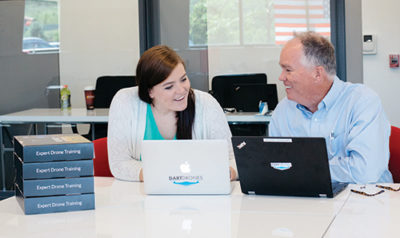
Abby Speicher Carroll talks with her dad and co-founder, Chris Speicher, an entrepreneurship professor at Marywood University.
A big obstacle to growth was finding enough qualified pilots to teach courses. Eventually, the company was able to recruit 13 pilots of commercial and military aircraft who had an interest in drone technology. The pilots were invited to a multiday train-the-trainer session, though the session’s location concerned Carroll. Because DARTdrones had no money to rent a training space, it had to make do with her parents’ house, with classes held inside and pilots practicing flying on the lawn. Carroll served the pilots mac and cheese and removed all pictures of herself to try to make the house look more professional. In the end, the pilots were trained and had a good time, and the company was on its way to going national.
Since then DARTdrones has continued to recruit instructors and today has about 35. Aviation is a male-dominated world, and as a young woman CEO, Carroll has encountered self-centered pilots who are dismissive of her. She doesn’t put up with them. “I have been deliberate about who joins the company,” Carroll says. “I have denied instructors who don’t seem like they could handle me being in charge.”
Then the Call Came
DARTdrones was on an upswing by the end of 2015, but the unpredictable entrepreneurial journey brought new challenges in 2016, with Carroll facing what she calls a “dark time.” A painful company shake-up, which she declines to talk about, was part of the reason. Beyond that, the long days spent building a venture were finally catching up to her. In a typical week, she worked 80 hours. “It wasn’t sustainable,” she says. “I was really burned out.”
To recharge, she went on a 10-day cruise with her parents and younger brother. The respite worked, and Carroll brought a new mindset back to DARTdrones. She vowed not to work as much, and away from the office, especially on weekends, she made a conscious effort to think less about the business. Not that she completely ditched her full, frenetic life. “She is not one to sit still,” says husband Mike Carroll, whom she married in 2017. For a time she took up painting, and then she and her husband remodeled a house, which meant hours of sanding, painting, and laying floors. Still, a change was noticeable. “The first year or two, every second of the day was DARTdrones,” says her husband. “She now has a different perspective.”
As the dark time subsided, Carroll got a call with major business implications. The previous year, she had applied to be on Shark Tank. Now the TV show called to say her application had been accepted. She would be pitching DARTdrones to the Sharks, the show’s panel of investors.
Carroll’s episode was taped in June 2016. “It was stressful leading up to it,” she says. “You’re worried, ‘What if I totally bomb?’” Thankfully, the taping went well, but afterward, she felt renewed stress. The exposure promised to boost DARTdrones’ business, but the network gave Carroll no indication of when her episode would air. So the company rushed to be ready, redoing its website and adding classes and instructors, while Carroll constantly checked the upcoming TV schedule.
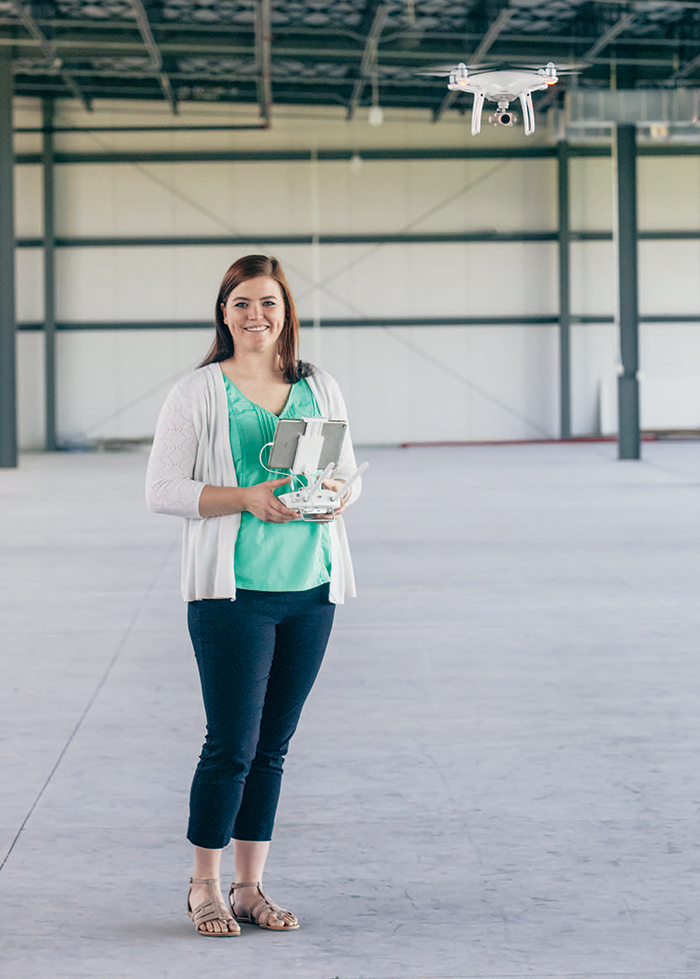
DARTdrones is located within a business center that supports and encourages startups. This large, unoccupied space, which is down the hall from DARTdrones, is slated for future businesses.
Ultimately, the episode didn’t air until February 2017. The night it premiered, Carroll’s parents threw a big party, their house packed with family, friends, and DARTdrones employees. Everyone marveled at Carroll’s poise on the screen, and once the show was over, they all cheered.
After the episode aired, DARTdrones experienced a surge in business. What the company didn’t receive from Shark Tank, however, was a deal. At the taping, Carroll had agreed to give Mark Cuban a 10 percent stake for $300,000, but once the paperwork came to make the deal official, Carroll had second thoughts. She couldn’t see herself giving up any control in the venture she had worked so hard to create. “Having someone in charge of me wasn’t going to work,” she says. “I can’t have a boss. I got into this to be my own boss.” In the end, the paperwork was left unsigned.
Today, thriving DARTdrones offers 40 classes a month across the U.S., and more than 8,000 students have taken its courses. Police and fire departments are big customers, with more than 100 having gone through DARTdrones programs. Although regulations keep some companies cautious about using drones, others are eager to embrace the aircraft’s potential, and so DARTdrones has been tailoring more programs to corporate clients, says Carroll.
Though DARTdrones has an office in Jessup, Pennsylvania, only a short drive from Carroll’s hometown of Dunmore, she and her husband make their home nowadays in Park City, Utah, near the company’s Salt Lake City office. The pair fell in love with the area while attending Salt Lake’s Westminster College, where they met.
Carroll’s husband joined the company in 2016 and serves as director of accounting. Initially, Carroll was nervous about blending her personal and professional lives. “After the first month, I thought it was the best thing,” she says. “It is really nice. We are never apart.” The two bring different strengths to the office, which helps them avoid stepping on each other’s toes. The creative Abby focuses on marketing and strategy, while numbers and logistics are the domain of analytical Mike.
Outside the office, Carroll keeps up her busy lifestyle. She hikes, camps, and snowboards. She also flies to Pennsylvania to visit family and check on the Jessup office. That office sits on a ridge overlooking a valley full of houses, highways, and communities. Standing there, Carroll looks out on a world she has known her entire life.
Despite all the ups and downs, Carroll remains passionate about entrepreneurship. “I hope I am a serial entrepreneur,” she says. “I hope I’ll use this experience for the next business I start.”
]]>From the wheel of his Ford pickup, which pulls his 33-foot-long RV trailer, Holland has driven many a mile. As rest stops, billboards, and exit signs blur by, his eyes may watch the road, but his mind roams elsewhere. “I’m trapped for hours with my thoughts,” he says. “You can’t escape them, but in a way, that’s good. Your mind can dwell on problems. You start thinking, how can I fix this? I’ve had breakthroughs with self-conversations.”
Holland is the founder and executive chairman of Storyblocks, a subscription service based in Arlington, Virginia, that provides stock images, audio, and video. Holland started the company the year before he enrolled at Babson, a kid chasing a dream in his parents’ house. Since then, it has grown into a successful enterprise with 100 employees and a digital library of 10 million files that subscribers can peruse. In 2017, the company earned $32 million in revenue.
That entrepreneurial journey was enthralling and rewarding, but it also overwhelmed Holland at times, leaving him feeling unsettled and burned out. “I was so immersed. I needed to come up for air,” he says. “I had a desire to get up and run.”
The RV, with its promise of wanderings and adventure, proved his salvation. He bought it in 2013. Out of town for a wedding, Holland found himself with some time to kill and, on an impulse, checked out an RV dealership. He always had enjoyed road trips, and suddenly, as he talked to the salesman, the idea of owning an RV began to feel right. Two weeks later, it was his.
At first, though, Holland was a little hesitant to use it. As CEO, he was fully engrossed in running the company, so disappearing in an RV didn’t seem like a smart idea. “I was really worried that, if I wasn’t present, things would fall apart,” he says. But his colleagues supported him, told him he deserved some time away, so Holland began taking regular jaunts of a week or more in his RV. He was never completely unplugged and was almost always reachable, but nonetheless, he felt lighter. The stress of the office melted away with the miles. “When I’m traveling,” Holland says, “I don’t dwell on anxiety.”
Fast forward to 2016. Holland removed himself from the company’s day-to-day responsibilities, stepping down as Storyblocks CEO and becoming executive chairman, and took to the road full time. He traveled from coast to coast and was amazed at the country’s beauty. “If I had to summarize America in one word, it’s variety,” he says. “I can go through the lush greens of Kentucky, to Tornado Alley and the flatlands of Oklahoma, to the majestic mountains of Colorado, and then end up in Malibu for drinks on the beach.”
Before taking to his RV, Holland hadn’t traveled to the heart of the country, to all those states that he and so many of us simply fly over on the way to somewhere else. Now he explores every nook and cranny of the U.S. and makes the effort to reach out and talk to people, whether coal miners in West Virginia or tailgaters at a NASCAR race in North Carolina. “I’ve met people from all walks of life,” he says.
Holland’s companion for many of these adventures has been his then-girlfriend, now wife, Mary Ashley, whom he married last year. Holland took it as a good sign that they got along so well even after spending months together traveling. “We were in close quarters, and we didn’t want to kill each other,” he says. Still, a few months ago, Mary Ashley decided to return to the couple’s often vacant home in Vail, Colorado, and resume working as a veterinarian. Around that time, Holland began to feel something he hadn’t felt in a while: the entrepreneurial itch. Yes, travel was wonderful, but after two years on the road, he missed the everyday fulfillment of working and business. “It hit me like a bag of bricks,” he says. “I got to do something.”
Holland had an idea. Having visited the 48 contiguous states in his RV, driving about 50,000 miles along the way, he saw that many RV parks are congested and unappealing. He then thought about how the country is full of farms and wineries. What if a company existed that could help RV owners find places like that to park their vehicles for the night?
Holland contemplated starting such a company but then discovered one already existed: Harvest Hosts. He contacted the owners, who had been running the venture for nine years, and asked if they were up for selling. After some negotiations, Holland bought Harvest Hosts in May and now runs a company that aligns perfectly with his love of RVs and traveling.
An annual membership at Harvest Hosts allows RV owners to stay for free at a network of more than 600 farms, vineyards, museums, and attractions, and Holland is hoping to sign up hundreds more locations. While he holed up in Vail for part of the summer, he remains on the road more often than not these days, with his wife often flying out to meet him. His RV has a cozy workstation, and his days have a predictable rhythm, with Holland taking business calls at 9 and 10 a.m. before hitting the highway.
For Holland, the road remains his office, his home away from home, his inspiration. “I find it hard to ease back on traveling,” he says. Perhaps one day he and Mary Ashley will have children, but he doesn’t think even that will curtail his wanderlust. “I know a lot of parents who take their kids with them,” he says. “You can throw your kids in the RV and have total flexibility.”
Traveling with Kindness
Leon Logothetis’ life is a series of adventures. And those adventures have put him in some daunting situations. Earlier this year, for instance, Logothetis ’99 embarked on a trek from Alaska to Argentina in a 50-year-old yellow Volkswagen Beetle. “I arrived in Alaska, it’s minus 30, and I’m in a car that doesn’t have any heating,” he says. In that instant, one thought blared in his head: “You’ve gone insane.”
To understand how Logothetis arrived at that moment, however, involves going back to 2005, when he was living in London and working as a stockbroker. From the outside, his life seemed like a success, but Logothetis was uninspired and unhappy, living what felt like some other person’s idea of the perfect existence. “It wasn’t me,” he says. “I reached a point where I was in a terrible place. The pain was so much, the feeling that I was wasting my life.”
Watching The Motorcycle Diaries, a romantic road movie about guerrilla leader Che Guevara’s travels as a young man, Logothetis grew inspired. “It touched me. I always felt this urge to go on an adventure,” he says. “I wasn’t built to sit behind a desk. I was built to connect. I was built to meet the world.” Feeling like he had no other option, he quit his job and set off on a life very much beyond the typical, a decision that left those around him baffled. “They thought I was a nut job,” he says.
Since then, Logothetis has become a traveling man, visiting more than 90 countries and undertaking a slew of fantastical journeys that have become the basis for books and TV shows. In its three seasons, Amazing Adventures of a Nobody, which aired on the National Geographic channel and also led to a book by the same name, Logothetis traveled across the U.K., the U.S., and Europe on 5 pounds, 5 dollars, and 5 euros, respectively, per day. In Live, Love, Explore, which is part memoir, part self-help book, Logothetis details his adventures and the life lessons he learned from them. For his most recent project, The Kindness Diaries, which was first a book that later became a Netflix TV show, Logothetis traveled around the world on a vintage motorcycle, relying on the kindness of strangers for food, gas, and shelter.
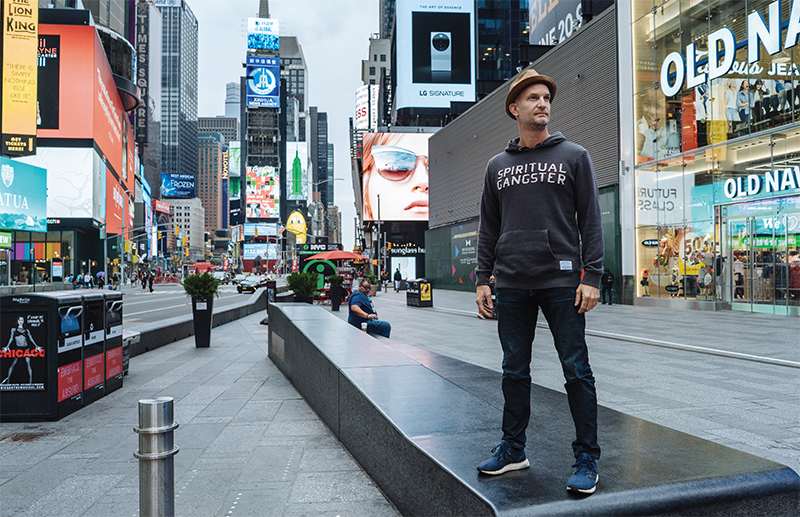
Photo: Gene Smirnov
New York’s Times Square holds special significance for adventurer Leon Logothetis ’99, who has visited more than 90 countries. He once launched a cross-country trek from there, traveling all the way to Hollywood, California, on only $5 a day.
Logothetis admits that approaching strangers and asking for help isn’t easy. Most people turn him down. But when he’s in an unfamiliar town and desperate for a place to sleep, he keeps trying. “You always find that person,” he says. “It’s about speaking to their heart.”
Whenever someone has helped him, he makes sure to return their kindness in some way. In one episode of The Kindness Diaries, Logothetis talked with a man named Tony in a Pittsburgh park. When Logothetis asked Tony if he could stay with him that night, Tony revealed that he was homeless. “My initial reaction was shame,” Logothetis says. “I’m asking to stay at his house, and he has nothing. What’s wrong with me?” But Tony offered to share some food and blankets, so Logothetis, deeply moved by the gesture, spent the night sleeping next to him on the concrete. Calling Tony one of the most generous men he has ever met, Logothetis says, “He taught me true wealth is not in our wallets. If he can be kind and he has nothing, then I have no excuses.” The next day, Logothetis offered to help find Tony housing and put him in a certificate program. Tony was left with tears in his eyes.
When Logothetis started going on adventures, he was motivated by self-preservation and the need to find fulfillment in his life. “I wanted to free myself,” he says. But as the years passed, and he encountered more people and drove mile upon mile, that motivation has changed. Now he hopes to embolden people to spread kindness and also to leave their unsatisfying jobs behind. “It’s not good enough to just travel for yourself,” he says. “My mission is to do everything in my power to inspire others to see there’s another way to live.” He has heard from thousands of people who have been touched by his travels. “I feel honored. That’s why I do this,” Logothetis says. “It makes traveling worthwhile. It makes freezing your ass in Alaska worthwhile.”
Speaking of the cold of Alaska, that’s where Logothetis started filming season two of The Kindness Diaries. His journey in that old Beetle from Alaska to Argentina, which took almost four months, was recently completed. The new season is set to premier on Netflix in December. Looking ahead, Logothetis already is planning the show’s third season, which will be a trek from South Africa to Finland, a more than 9,000-mile journey. “You never know what’s going to happen,” he says. “I look forward to the Sudanese border.”
While he’s a man at home in the world, Logothetis does rent a house in L.A., even if adventures and motivational speeches, of which he delivered 100 last year, mean he’s rarely there. Still, he enjoys those brief moments of rest, until it’s inevitably time to get moving again. “I get itchy feet,” he says.
Connecting with Culture
A prolific traveler for her job, Jaclyn Leibl-Cote, MBA’15, is away from home about 90 days in a typical year. Ask where she went last year, and she’ll start rattling off destinations, Dubai, Abu Dhabi, Spain (twice), Canada, the U.K., before pausing to think. The trips have become a blur in her mind. “I’m definitely not remembering,” she says.
Leibl-Cote is president of her family’s business, Collette, a 100-year-old travel company based in Pawtucket, Rhode Island. With close to 700 employees around the world, Collette offers over 160 group tours, which take travelers to 56 countries. Leibl-Cote and her team supervise the dozens of guides who bring these tours to life, as well as examine the company’s offerings to see which tours to improve and add.
Everything on a tour is planned. Leibl-Cote and her team vet hotels, restaurants, bus and train companies, and attractions, and they travel to destinations to perform the vetting. Such excursions may sound exciting, but the work is exhausting, the days long and tiring. A city may boast hundreds of restaurants, for example, and the team’s job is to winnow those down and select the right ones for the tour. “When I interview people for a job, I say, ‘This isn’t a vacation,’” Leibl-Cote says.
Collette always is thinking about its tours and every year adds between 10 and 20 new offerings. The travel industry is full of copycats, says Leibl-Cote, noting that other travel companies have copied Collette’s tours down to the itinerary. “You can’t trademark the world,” she says. “We have to always be creative.” The company also must try to anticipate where its customers, who often seek destinations that haven’t been “discovered” yet, will want to go. The decision process is part market research and part intuition. Sometimes the company is wrong, but other times it nails it. “We launched Iceland with one tour,” Leibl-Cote says, “and it just took off.”
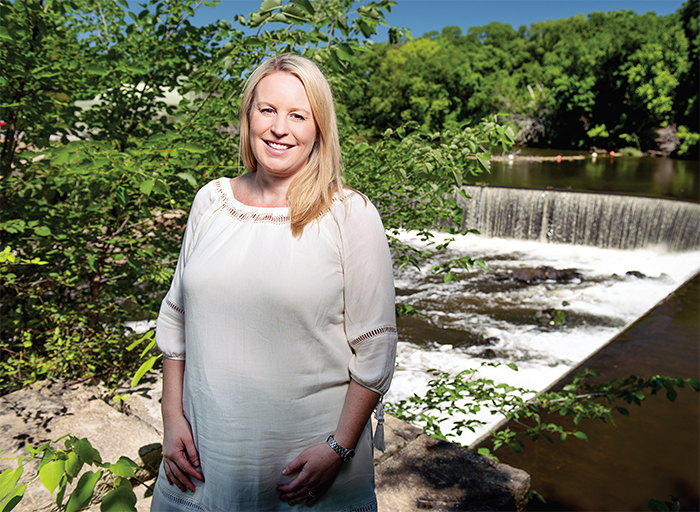
Photo: Webb Chappell
Jaclyn Leibl-Cote, MBA’15, is president of Collette, a 100-year-old travel company that’s based in Pawtucket, Rhode Island, in an office along the banks of the Blackstone River.
Collette also must keep up with travelers’ expectations, which have changed over time. “Travel used to be about the bucket list,” says Leibl-Cote. “People would want to see the Eiffel Tower. They would want to go to the Colosseum. People want experiences now. They want to meet people in a local village, to sit in a cafe, to do a cooking demonstration, to feel like they’re living like a local. We’re connecting people with culture, we’re connecting them with experiences.”
The ability to connect with a culture, to immerse oneself in it, is one of the main allures of travel for Leibl-Cote. “For me, travel is the biggest educator. It is a gift,” she says. “I live in Rhode Island. That would be a very small place to stay. You have to spread your wings and see what’s out there.” Leibl-Cote doesn’t make assumptions about a country or culture from what she sees in the media. “I see it with my own eyes,” she says. “When you go there and walk in the footsteps of people and talk to them, that can bridge stereotypes.” Leibl-Cote hopes all Collette customers take away such a deeper understanding of a place from their trips. “I hope they feel connected to the culture they visited, that they come back and have an appreciation of the people,” she says.
Nowadays, travelers can do so much of their own trip planning online, from booking hotels and flights to researching restaurants and sights to see, but sifting through the myriad choices the Internet provides can be difficult. That’s why the personal touch that Collette provides is still valued, says Leibl-Cote. “We had a record year in 2017,” she says. “We’re seeing upward trends in growth.”
Leibl-Cote is one of eight family members who work full time at Collette. Her grandfather bought the business in 1962, and she has worked there for much of her adult life. Her three children, twin 7-year-old boys and a 5-year-old girl, represent the company’s next generation. “They see the hard work that goes into it,” she says. “I do it for the three of them. It’s a family business. I want to pass it on to them.”
Of course, leaving the three of them to go on work trips isn’t easy. As much as Leibl-Cote loves to travel, as much as she loves adding another stamp to her passport, she also loves to come home. When her airplane lands at Boston’s Logan Airport and the pilot over the intercom says, “Welcome home,” she takes that to heart.
Sailing on the Wind
Ever since he was a boy, Robert Lahue ’99 wanted to take to the sea. For a long time, that dream was his alone. After graduating from Babson, however, he and his then-girlfriend, Betsy, sailed off the East Coast for a year. When that voyage was done, they looked to the future and vowed to sail again together one day. “I found someone who embraced my dream as well,” he says. “It became our dream.”
Robert and Betsy got married, had three boys, and built careers. She was an executive at a medical device manufacturer, while he was a real estate investor. They hadn’t forgotten about their dream of the sea, and in fact were setting aside 10 percent of their income every year toward making it happen. But still, time was passing. They felt settled in the New Jersey town they called home. Could they really uproot their family, walk away from their careers, and take off on a long sailing adventure? “We realized we have to do this before the motivation was lost,” Lahue says. “I wouldn’t have been happy with myself if we didn’t make it happen.”
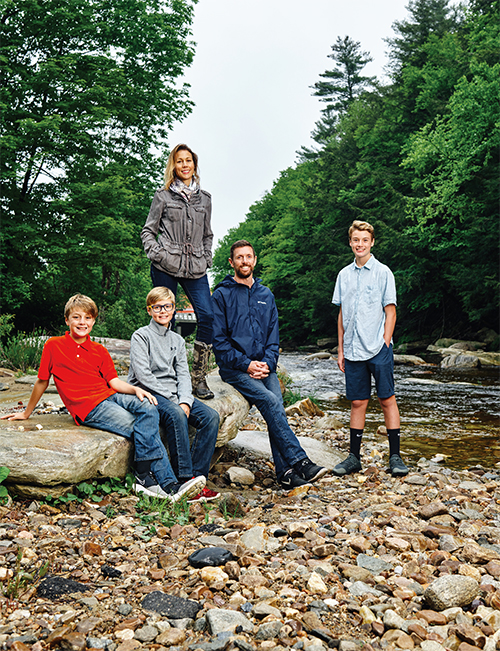
Photo: Douglas Levy
The Lahue family (left to right), J. Oliver, Myles, Betsy, Robert ’99, and Henry, now make their home in Stratton Mountain, Vermont, after spending nearly two years sailing aboard the Alkemi.
So they decided to go for it. Betsy quit her job, and Lahue began selling off his rental properties. They sold their house, and they bought a boat, a 45-foot sloop named Alkemi. Their boys, Henry, Myles, and J. Oliver, then ages 12, 10, and 8, looked forward to the upcoming journey with excitement, and their friends and family were left to marvel that the Lahues were actually doing it, that they were leaving everything behind to take the trip of a lifetime.
In the summer of 2016, the family moved aboard the Alkemi, sailing down the East Coast out of Maryland. Immediately after departing, the family relished all the time they suddenly had together. Back in New Jersey, their days had seemed so hectic, the adults with their careers and social obligations and the kids with their many activities. “We all had our own lives,” Lahue says. “We were getting to know each other again.”
Still, the relentless feeling of needing to keep busy took a long time to fade away. “We used to measure our day by how much we accomplished,” Lahue says. “It takes a while to get that out of your system.” Sailing to the Caribbean and then to Central and South America, Lahue says it wasn’t until the family reached Colombia, a good 11 months into the trip, that he finally was able to accept and ultimately embrace a slower pace of life. “We didn’t have to fill every moment anymore,” he says.
As life slowed down, the children relied more on their imaginations to amuse themselves. They read books and kept journals. One son played guitar, while another created an elaborate make-believe country. The family also made time for their faith, something that had slipped away from them in their busy lives in Jersey. Their return to spirituality was partly inspired by having time to sit, enjoy a sunset, look at the stars, and contemplate. But the family also came to rely on their faith when confronted with uncertain situations, such as during storms. The family once was caught in a gale with 12- to 15-foot waves, which crashed over the boat. While the children were kept safely below, the adults were on deck, watching the boat’s course. “You are wearing a life jacket and hooked in with a harness,” Lahue says. “My wife and I had to comfort and reassure each other. It was frightening.”
As the trip went on, the family traveled from Panama and Colombia, to Jamaica and the Cayman Islands, to Mexico, Cuba, and back to the U.S. Throughout the journey, the Lahues encountered a range of people. Lahue recalled how they became friendly with a family from Israel on another boat. “The kids didn’t know each other’s languages, but they played with each other a lot,” he says. As they made excursions on land, the Lahues also met people living in severe poverty. “Those kinds of experiences were good for the children to see,” Lahue says. “You get wrapped up in wanting things. It gives you a new perspective on your life.”
Finally, the trip came to an end this past April in Key West, Florida, and Alkemi was sold to a new owner. The adults felt like they could have continued on, but the boat was starting to feel smaller as the boys grew older and taller, says Lahue. The boys also were eager to return to a regular school after being home-schooled for two years on the boat.

Photo Courtesy Robert Lahue ’99
The Lahues sailed aboard the Alkemi, a 45-foot sloop.
As he looks back on the voyage, a dream Lahue had harbored for so long, he thinks about how it turned out differently from what he had envisioned so many years earlier. “I thought it would be about seeing cool places and being in tropical destinations,” Lahue says, “but ultimately, it was about spending more time with family and learning to appreciate a simpler life.”
To hold on to that simpler, more laid-back lifestyle, the family has moved to their ski condo in Stratton Mountain, Vermont, and Robert and Betsy are now trying to figure out what the next step in their careers will be. They’re hoping to tackle an entrepreneurial opportunity.
They’re also hoping one day to return to the sea. Next time, they want to sail and explore the Pacific.
]]>So the then 14-year-old approached his father, Sari, with a concept for an app. It would let people take photos of their possessions, organize and track them in groups, and either keep the information private or share the collection with others. Collectors then could talk about their passions, follow each other, discover new ideas—just like members of a club.
In some ways, Anabtawi knew his father would like the idea. Years earlier, when the family was on vacation, their suitcase was stolen, spurring his father to think about a similar idea for a digital organizer. “My father dealt with the insurance and all that headache, and he wished he had a private repository of everything that was in the bag. But apps weren’t a thing back then,” says Anabtawi, “and websites were primitive. The best he could do was use an Excel spreadsheet, but that wasn’t intuitive. So he kind of forgot about the idea.”
When Anabtawi explained the app to his father, who also is a collector, Sari immediately saw its value. The private option would allow people to keep track of their belongings, while the ability to make collections public and grow communities would make it potentially interesting to a much broader audience. Revenues would come from data mining.
They named the app Snupps, which stands for Serial Number Universal Protection Protocol System, and in 2011 opened an office in their hometown of London. From the start, Anabtawi says his father treated him as an equal partner. “I was very involved with everything,” he says. When they met with an angel investor, he was in on the pitch. When hiring a chief technology officer and a developer, he and his father interviewed and decided on employees together. At 15 years old, an enthralled Anabtawi would come home from school every day and go straight to the office. In 2014, Snupps launched its app on Android, iOS, and online. With user input coming in, Anabtawi turned his focus to fine-tuning product design and strategy. “Our philosophy is to constantly solve problems for the ideal users,” he says, “and the ideal user of Snupps is me.”
The time also had come for Anabtawi to choose a college. Both a friend of the family and his guidance counselor suggested Babson, and, after some research, Anabtawi agreed. Initially, he was concerned about being so far from the London office, but Anabtawi transitioned. Whenever possible, he would group classes in the morning or afternoon to maximize the time available for work. “Having Fridays off was incredible,” he adds.
Balancing work and school was hard at times, admits Anabtawi, but he also has brought a lot from the classroom to Snupps. Anabtawi participated in the San Francisco program, which proved to be hugely beneficial. “Every class tied into Snupps somehow,” he says. “We had a tech consulting class, where we were helping companies with problems, and a lot of those problems were the same that we were facing. I realized that within the space of three hours, I was actually learning something in class and then applying it to my company.”
One of Anabtawi’s professors, senior lecturer Mary Gale, helped him with his presentation deck. “She looked at it and was like, ‘It’s pretty good, but you have to change the whole thing.’ I said, ‘We’ve been using the same deck for three years. What do you mean, change the whole thing?’ She sat with me for maybe three hours and walked me through it,” Anabtawi says. “I presented it to the office, and my co-workers asked how much I had paid for the advice.”
Back on Babson’s Wellesley campus, Anabtawi valued such classes as “Platforms, Clouds, and Networks” with professor Bala Iyer. The course gave Anabtawi a more comprehensive understanding of the tech infrastructure, helping him see how Snupps fits in and where it should be moving. “I brought these insights back to the office and presented to the whole team, and it actually pivoted our goal for the next year,” he says.
Because he took extra courses, Anabtawi graduated in December, but he is staying in the U.S. until May to attend Commencement. “I want to take this time to figure things out and work on growing Snupps in the U.S.,” he says. Snupps currently has almost 2 million users, but Anabtawi is hoping to bump that number dramatically. To attract new users, he focuses on social media, working with well-known YouTube personalities. Snupps also recently partnered with eBay, making it easy for the app’s users to sell their wares: An icon in the Snupps app lets users upload items to eBay in about 30 seconds, and Snupps gets a cut of what eBay makes. Anabtawi also wants to use the time before Commencement to meet more people. “I haven’t had a chance to network much in Boston,” he says, “and there’s a huge tech hub in Boston and even at Babson.”
Anabtawi liked having other students to talk with about entrepreneurship at Babson, although he concedes that he probably has offered more advice than he has received. “That’s just because I started this process at age 15,” he says. “A lot of my friends are in those shoes that I was in a few years ago. They ask all these questions. I really love talking about the experience and helping people through that stage, because the most exciting time is getting started.”
ENTREPRENEURS OF ALL KINDS
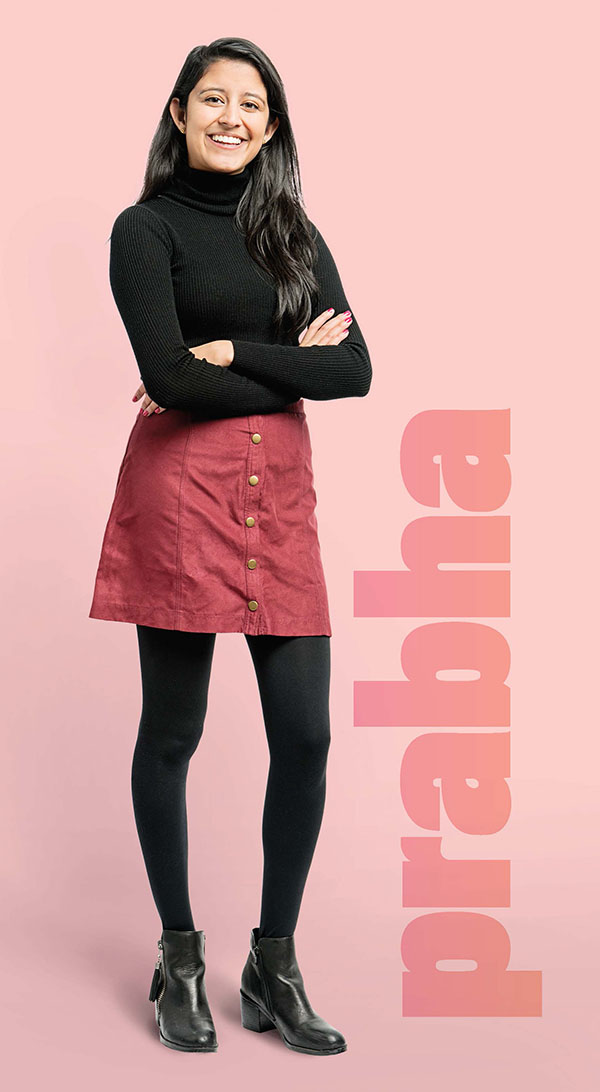
Prabha Dublish ’18
Prabha Dublish ’18 describes herself as “somewhat shy.” At a networking event, she isn’t likely to walk up to strangers and start conversations. She also isn’t fond of talking in front of crowds. Even raising her hand in class feels awkward—all those eyes and all that attention focused on her. “I don’t really fit into the stereotypical mold of an entrepreneur,” she says.
At the same time, when Dublish sees a problem, she acts. As a junior in high school, she noticed that peers who were supposed to be donating time to the community as a requirement for National Honor Society were getting friends to sign off on hours. As someone who cares deeply about social impact, Dublish was bothered by their actions. So at the age of 16, she started a nonprofit called Charity Cycle in her hometown of Seattle. “It shifted the focus from hours to impact,” she says. “I would bring community service activities to our City Hall, play fun music, and make it so people have a good time, but also at the end we got a certain amount of work done. I tried to focus on the impact.”
Standing in front of her fellow students to organize their activities was intimidating. “But it helped me build a lot of the skills that I use today,” Dublish says. “It was something that I loved doing. The organization is still running.”
When deciding on colleges, Dublish knew she wanted to study business, but she wasn’t sure where to go. She learned of Babson from Facebook posts of former schoolmates, applied, and received a Weissman Scholarship. During her first year on campus, Dublish lived in Park Manor Central, and she became friends with Derek Tu ’18. “He was always someone who pushed me to think of different ways to address things,” she says.
Dublish also became intrigued by alumni who had started businesses. “In many ways, it changed their lives, right? But I was curious to see what entrepreneurship looked like in communities where they didn’t have the same access to resources like we do here at Babson,” she says. So the summer after her first year, Dublish used the stipend that comes with a Weissman Scholarship to travel to northern India outside of Delhi, where her family originally is from, and meet with women entrepreneurs in underprivileged villages. “It was an incredible experience,” she says. “It’s not just about the power that comes from starting a business. Obviously, there’s an income stream, but there’s also a huge rise in these women’s confidence.”
Dublish also realized how difficult it was for these women entrepreneurs to get started. With no education or income, they didn’t qualify for loans, and their husbands and families typically were not supportive. Some had received entrepreneurship education through programs run by NGOs, but then they had no access to capital. “They were given a toolkit, but they weren’t given anything to use,” says Dublish. She talked to the women about microloans, but they didn’t like the idea. “They didn’t want to send their hard-earned money back to the United States, which they perceived as wealthy,” says Dublish. Instead, the women would pool their money and give it to other women in the community who wanted to start businesses.
Dublish was inspired by the faith and trust the women had in each other and, upon returning to the States, wanted to mirror their efforts. So she came up with the idea for Womentum, a crowdfunding platform that allows people to donate to women entrepreneurs starting businesses in developing countries. As she often had before, Dublish talked with Tu about her idea. Having started several companies, he was a great sounding board. “Derek is such a powerhouse when it comes to entrepreneurship, and he has a strong marketing mindset,” she says. “I feel like I have such a strong social-impact background.”
Tu encouraged Dublish to move ahead with the nonprofit, and he became a co-founder. He asked his friend and tech-whiz, Aaron Leon, to be a co-founder as well. “Aaron goes to college in Chicago, and he actually built our entire platform,” says Dublish. “We each bring something to the table, which I think is great with our co-founding team.” The trio launched the site before the end of their sophomore years. Womentum is a 501(c)(3) nonprofit, so donations are tax deductible, and 100 percent of donations go to the women.
In her junior year, Dublish participated in the Boston Women Innovating Now (WIN) Lab, offered by Babson’s Center for Women’s Entrepreneurial Leadership. “WIN Lab was life changing,” she says. It helped focus her vision and made her accountable. At the end of the eight-month program, Womentum went from funding four women in two countries to funding 36 women in six countries. Since then, the nonprofit also has secured four new corporate sponsors.
The long days of running a nonprofit and attending school can be trying at times, notes Dublish. “Sometimes those days are worth it, when your business is going well and donations are coming in,” she says. “But if you have a 13-hour day, and you spent the entire day putting out fires, then having to do your homework is definitely difficult.” Nonetheless, she wouldn’t have done anything differently. Ups and downs build resilience, she says.
Although Dublish may always feel a bit shy when speaking in front of crowds, she has found new confidence since working on Womentum. “One of the most incredible things I’ve learned is that we tend to portray a certain kind of outgoing person as an entrepreneur, but I think I bring something new to the table,” she says. She has pitched in front of hundreds of people, and Womentum even won “Fan Favorite” at a recent pitch event. “I felt like that was such a huge point in my life,” she says. “I remember calling my mom afterward, and she was like, ‘This is so incredible. What happened to my daughter who would never talk or raise her hand?’”
NEVER SAY NEVER
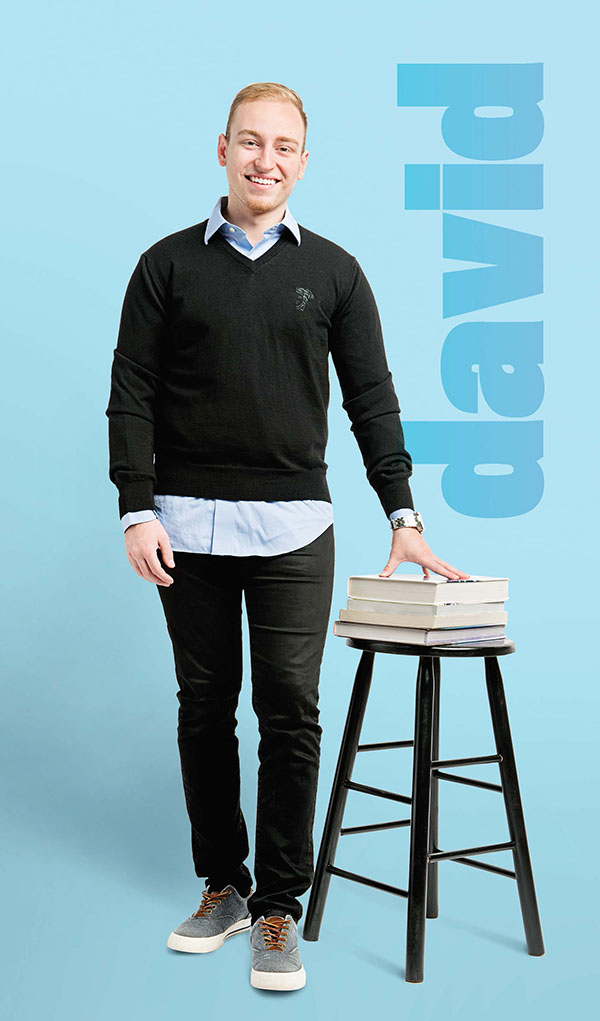
David Zamarin ’19
Ask David Zamarin ’19 where his business drive comes from, and he’ll tell you it began with his grandfather. When Zamarin was 3 years old, his grandfather would come home from work, take off his socks, and offer the toddler a dollar a day to clean them. Even as a child, Zamarin realized that people will pay for desirable services.
Zamarin’s drive to succeed also comes from a difficult childhood. After his parents divorced when he was 2, he lived with his grandparents in a rough Philadelphia neighborhood while his mother worked retail jobs and earned a degree in civil engineering. Eventually, his mother finished her degree and landed a good job, but the years left an impression on Zamarin. “Seeing my mother struggle was tough,” he says. “It kind of inspired me to be entrepreneurial and independent.”
The young entrepreneur started his first “official” business in the fifth grade, buying and reselling popular items such as headphones and watches at flea markets. Then as a freshman in high school, Zamarin applied to a city-run youth entrepreneurship program. “There were 2,000 applications, and 20 were accepted,” he says. “I was the only nonsenior.”
The program provided the aspiring entrepreneurs, who were tasked with starting businesses, with guidance and mentors. Zamarin’s idea for a business stemmed from a pet peeve. A sneaker collector, he hated getting his shoes dirty, so he thought about creating a protective film that could be sprayed on the sneakers. But Zamarin couldn’t fathom how to make such a product, so his mentors suggested starting a shoe-cleaning business. Although initially turned off by the idea, Zamarin came around after doing some research. He named the company Lick Your Sole and focused on university sports teams, contracting to clean athletes’ shoes on a biweekly basis.
Zamarin landed four lucrative contracts and ran the business, which at its peak was bringing in about $25,000 a month, his entire freshman year. He then was looking for a way to scale but didn’t see an obvious route, so once again he began thinking about that protective spray. At the same time, he had an employee whom he paid on commission. “This individual moved to California and wanted to expand the business there,” says Zamarin. “Instead of expanding it, he actually bought me out completely. I sold the company for six figures, which was the most money I ever had.”
With such a successful year, Zamarin became well-known in the Philadelphia entrepreneurial community. “I had a lot of eyes on me,” he says, including serial entrepreneur Bill Green, who had become a close mentor. “I got a good network behind me, and that really motivated me early on.”
Feeling inspired, Zamarin decided to focus on developing a spray. He began researching nanotechnology, which was used by a competitor’s product, and came across the lotus leaf, which has a natural wax coating. He reached out to a friend with a Ph.D. in chemistry, and the friend let Zamarin use his lab after hours. Teaching himself through lessons found on the internet, Zamarin figured out how to decompose the lotus leaf and devised a formula.
But one key was missing. To make the product consumer friendly, the spray had to dry clear. Other sprays already existed, but they dried white. That might be OK for industrial applications, explains Zamarin, but not for consumer applications, such as using the spray on shoes or furniture. While researching production, Zamarin found a manufacturer in Florida whose scientists came up with a 2 percent proprietary addition to Zamarin’s formula that made it dry clear. Naming his business DetraPel, Zamarin incorporated in the summer of 2013 and launched in February of the following year. He was a sophomore in high school. “We ran with it for eight months, hit about $80,000 in revenue, and then my manufacturer went out of business,” he says. “When they filed for bankruptcy, I lost the formula and that crucial 2 percent.”
For several years, Zamarin worked to re-engineer the formula, contacting more than 12 labs, domestically and abroad, and paying close to $100,000 in research and development. “None of them were able to do it,” he says. At the same time, he focused on business-to-business customers who didn’t demand a clear-drying product and brought in six-figure annual revenues.
Zamarin also turned his focus to college. In addition to Babson, Zamarin was accepted at Harvard and the Wharton School of the University of Pennsylvania. Then he visited Babson and met professor Joel Shulman, who became a mentor to the young entrepreneur and introduced Zamarin to influential alumni. A scholarship offer sealed the deal. “The network you meet and the connections that you make through Babson—you’ll have those for the rest of your life,” he says.
Despite being drawn in new directions, Zamarin never had given up on finding the right formula. In 2016, during the winter break of his first year at Babson, he went back to the lab where he came up with the original formula, re-examined all the notes and research he’d done in the past, and began testing and tweaking. By the summer, he finally found what he was looking for—a formula that dries clear. “The difference between us and what most people were doing is not only the compounds that we use,” he says, “but also the process that we have for making some of these compounds.”
Zamarin fully relaunched DetraPel in August 2017, starting with the business-to-business market. Now he is poised to scale and take the company to consumers. He has attracted high-level investors, including a deal with Mark Cuban and Lori Greiner after an appearance on Shark Tank, and he also offered his mentors an opportunity to invest. “I count all my success to the help and mentorship I’ve had,” he says. “I’m very loyal to my network.”
Zamarin’s mentors inspired him to help others as well. “I also have to give back,” he says. “I spoke at a youth entrepreneurship conference recently. I want to give other kids the inspiration they might need, because I had that from an early age.”
ACCESS TO EDUCATIONAL RESOURCES

Michael Ioffe ’21
Michael Ioffe ’21 realized at a young age how access to educational resources can positively impact a life. Halfway through the fifth grade, he was sent to Access Academy in his hometown of Portland, Oregon. Although highly gifted, Ioffe wasn’t doing well academically, and this public school specialized in helping children like Ioffe succeed.
The school was a 40-minute commute to the other side of town, but Ioffe immediately felt a part of its community and began to thrive. The school, however, needed funds and support. “The entire school—this vital resource—was in three portables, and that was our only home,” Ioffe says. “The school district repeatedly tried to kick Access out and get rid of the school, because the neighborhood was gentrifying and the elementary school next door needed space.”
Ioffe had an idea. Recognizing that some of his fellow students were brilliant writers, he proposed publishing an anthology of their stories to raise funds. “I packaged their stories into three books, one every year I was there, to raise awareness of our school and our needs,” he says. “In the eighth grade in particular, I ended up being pretty successful, and Access got a new building, which was fantastic.”
Ioffe didn’t stop there. In high school, he discovered that many of the Portland schools were overcrowded and in disrepair. A lover of architecture, he became the student representative to a committee tasked with overseeing the reconstruction of his high school as well as the group creating its master plan. Then just before his senior year, a problem with lead in the water was discovered, creating a sense of urgency to rebuild. To try to force the school board to act more quickly, Ioffe organized a student walkout. “It was the largest student walkout in Oregon history,” he says. “I led 1,500 students on a four-mile march across the city.” In the spring of his senior year, voters passed a bond to fund new school development.
But another endeavor that Ioffe started during high school has had an even greater impact, affecting students both in the U.S. and around the world. A curious youth, Ioffe tried to meet with various leaders in his community his sophomore year. “I reached out to more than 50 business and nonprofit leaders, asking for a conversation because I wanted to learn, and every single one rejected my request—except for one guy, who said, ‘Listen, I won’t talk with you individually, but if you bring 100 of your friends together, I’ll speak with all of you,’” Ioffe says. “I was like, all right!”
At first, Ioffe went to the Portland Business Alliance and proposed creating a place for business leaders and students to connect and talk, but it rejected his idea. So he decided to create a conversation series. “My goal,” he says, “was to bring students from all types of backgrounds, particularly students who didn’t have access to educational resources in business and entrepreneurship, and give them an opportunity to listen to business leaders and have a conversation with them.”
To pull this off, Ioffe needed speakers, an event space, and a crowd of students. He walked around Portland, knocking on doors and asking businesses to donate space. Eventually, he convinced the Portland Center Stage to donate its basement. Then he called and emailed business leaders until he persuaded 10 to participate. Each event would last an hour and feature one of the speakers; for 30 to 40 minutes, the speaker would answer 10 questions asked by Ioffe, with the remaining time devoted to questions from the student audience. Ioffe even got the Portland police to provide free security and the public schools to bus students who needed transportation. Local newspapers covered the events, which were a hit. “The coolest thing was there was no overhead,” says Ioffe.
About halfway through the series, Ioffe realized the model could be replicated in other parts of the country, even the world. So after each event, he reflected on what could be improved and created a manual detailing everything students would need to start their own conversation series. Thus began TILE, or Talks on Innovation, Leadership, and Entrepreneurship, a worldwide network of independent student organizations that host free conversations with interesting people in their communities.
To get other students interested in hosting a TILE event, Ioffe initially tried connecting with college counselors, but he found that didn’t work. “I realized that I had to target students who were looking for a way to learn,” says Ioffe. He started frequenting the question-and-answer website Quora, answering questions from students about innovation, leadership, and entrepreneurship. “I mentioned that if people wanted to learn more, here’s an organization, TILE,” he says. “Eventually, that proved to be incredibly successful.” By his senior year in high school, Ioffe had launched 250 chapters in 37 countries.
When applying for college, Ioffe was deciding between architecture and business schools. With TILE in full gear, he decided to come to Babson and received a Weissman Scholarship. Upon arriving, his priority was to build a team, which he did with a grant from the Helen Diller Family Foundation. “Thankfully, Babson has a lot of students that are really passionate and interested in doing something that matters,” he says. He also launched the TILE platform, an online directory that facilitates setting up TILE chapters. “You plug in where you’re located, and it gives you a list of speakers and event spaces near you,” says Ioffe. For help building the platform, Ioffe reached out to Jinn Tech, a tech consultancy founded and run by current and former Babson students.
Managing TILE and balancing school work can be challenging, but Ioffe doesn’t mind. He likes being able to talk about TILE with other entrepreneurs at Babson. “People are supportive,” he says. “A few of my friends who are at other, less entrepreneurial schools say they can’t talk about their projects because people just don’t get it.”
At the same time, Ioffe tries to remain humble about his accomplishments. “As a successful entrepreneur, you get a lot of validation, but that should never translate into arrogance or overconfidence,” he says. “When students come to TILE events and get to chat with somebody they look up to, I think the most important realization is that this person is human, you know? This person is not very different from me. And you start to realize, if this guy is head of a $125 billion company, there’s nothing stopping me from doing the same thing.”
]]>The Weissman Foundry will be that place. Named in honor of Bob Weissman ’64, H’94, P’87, ’90, and his wife, Jan, P’87, ’90, whose lifetime giving to the College reached $100 million this summer, the 9,800-square-foot building was co-designed by students, faculty, and staff of Babson and Olin colleges to inspire collaboration between the campuses.

Rendering: Dongik Lee
“We are missing a space that’s owned by the students,” says Michael Johnson, provost. “This will be a place where students can camp out for months or a whole academic year working on projects. It is going to be a place where they can follow through on their business plans and ideas, and create something while they’re students.”
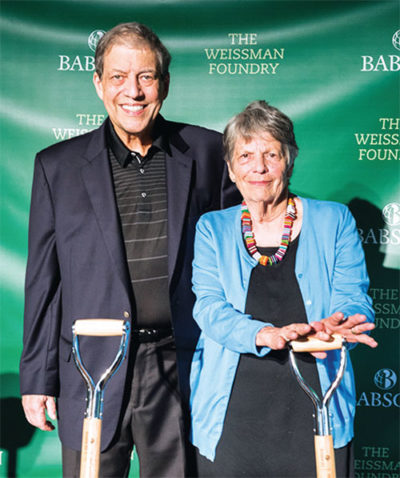
Photo: Justin Knight
Bob Weissman ’64, H’94, P’87, ’90, and his wife, Jan, P’87, ’90
Startups incorporate multiple disciplines, notes Johnson, so working with Olin to encourage student partnerships simply makes sense. “We are starting to break down a couple of silos—you think like a business person, you think like an engineer, you think like an entrepreneur,” he says. Bringing these students together helps them understand different approaches to problems and learn new ways of thinking. “You end up with someone who is going to be much more successful,” he says.
To make the facility accessible to both campuses, it will be constructed on Map Hill Drive in view of Olin’s Academic Center. In addition to dedicated workspace, the building will include a kitchen, a lounge for informal meetings, and flexible classroom space. Alcoves off the main room will house various resources, such as small tools, digital fabrication technology (3D printers, scanners, and more), sewing machines and associated equipment, and tools for building small electronics (soldering equipment, LEDs, computer boards, and the like).
The building design includes floor-to-ceiling glass panels so that the space will be visible and inviting to passersby, and it will be open 24 hours a day, seven days a week. A student competition was held to name the building, with “The Foundry” being one of the finalists. “Bob and Jan loved that name because things are going to be made there,” says Johnson. “So that’s the one they picked.”
Construction is slated to begin in the spring and will be completed in time for Babson’s 2019 Centennial celebration. In the meantime, Johnson and cohorts, including students and faculty from Babson and Olin, will devise additional programming and courses that take advantage of the unique space. “This has been one of the most fun projects I’ve ever worked on,” Johnson says. “It will be a place where Babson can truly create value.”—Donna Coco
]]>Thirty years earlier on that very date in that very building, DeMello’s career made a drastic departure. He had left behind his lucrative and stable job as a stockbroker to enter the crazy and uncertain world of entrepreneurship. Not everyone considered the move a smart decision at the time. “My friends thought I was insane,” says DeMello.
But standing in that lobby 30 years later, serial entrepreneur DeMello came to take a moment and reflect on everything that had happened after that March day, on the string of businesses he has started through the decades, on a career that has brought him rewards and fulfillment, and how, after all the ups and downs, he was still in the business of dreaming up a notion and making it a reality. “There’s artistry in starting a company, shaping an idea,” he says. “I do it because I love creating and innovating. It’s what I do.”
This wasn’t the first time that DeMello has taken time to commemorate March 13. He came to the same lobby on the 20th and 25th anniversaries of the day as well. DeMello considers it one of the two most important days of his career.
And that other day? It happened some years earlier, when DeMello was a Babson student and a fire was lit in his gut that still hasn’t gone out.
Striving for Simplicity
A life in entrepreneurship makes for full days. DeMello often wakes at 5 a.m., and before the business of the morning begins, he hits the pool. Working out is a regular part of his routine, whether he’s swimming, running, or biking. DeMello enjoys long runs along the Charles River, and a couple of months back he tackled San Francisco’s Escape from Alcatraz Triathlon. He once even did an Ironman. “I like pushing myself to a further place,” he says.
DeMello lives in an apartment in the Back Bay neighborhood of Boston. Once he finishes his morning workout, he takes a five-minute walk through Copley Square and past the Boston Public Library to the office of his latest startup, Gradifi. The bright, airy office sits above the hustle and bustle of Boylston Street, and pictures of runners hang on the walls, a nod to the nearby finish line of the Boston Marathon.
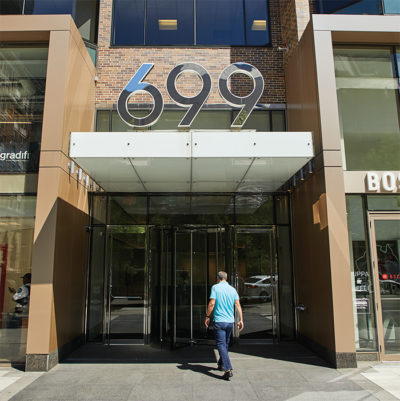
Photo: Pat Piasecki
Gradifi’s offices are located on Boylston Street, near the finish line of the Boston Marathon.
DeMello has a big mission with Gradifi. Founded in 2014, it’s seeking to lessen the heaps and piles of student debt that are burdening college graduates. According to Forbes, the total amount of student loans in the U.S. is $1.3 trillion, which exceeds the amount of debt from credit cards and auto loans. Some 44 million people have borrowed money for their education, and every May, as fresh graduates take off their caps and gowns, that number climbs higher. “The problem just keeps going,” says DeMello. “It’s really staggering.”
DeMello’s response was to create a new employee benefit. Through Gradifi, employers can make direct contributions each month to help pay their workers’ student loans. It’s proving a popular idea. More than 100 companies have signed up for the service so far, and, in December, Gradifi was bought by San Francisco’s First Republic Bank and is now a wholly owned subsidiary. DeMello’s hope is that student loan repayment one day will be as ubiquitous a benefit as 401(k) accounts or tuition reimbursement.
Kathy Borowy, Gradifi’s CFO, believes that DeMello has the diligence and drive to make that happen. “He doesn’t get distracted by noise. He’s focused on what he wants to do,” Borowy says. “When there’s something critical, the passion and intensity goes up 10 notches.” At the same time, he’s a visible leader who likes to walk the floor and talk to employees about what is going on, but he also trusts them to do their jobs. “He lets us figure out what we want to do. He doesn’t get in your way,” Borowy says. “He’s someone you enjoy working with.”
DeMello also is compelling when talking to the media and spreading the word about Gradifi. “He’s been a really good salesman,” says Doug Lowenstein, Gradifi’s COO. “He has a strength to describe what we do succinctly. He packages it in a way that people get right away.” DeMello works hard to get the message just right. Lowenstein says they spent a lot of time deciding what to call the benefit Gradifi is offering. They settled on Student Loan Paydown Plan, or SLP Plan for short. “He thinks things through thoroughly,” says Lowenstein. “I’ve learned there’s a lot of value in expressing an idea cleanly.”

Photo: Pat Piasecki
Tim DeMello talks with office manager Jacqueline Diamond.
Simplicity is the essence of what DeMello aims for in his work, as well as in his personal life. He strives to live in a way that’s uncomplicated and uncluttered. He doesn’t make big purchases. He doesn’t own property. He makes no investments. He eats dinner at the same restaurant, Post 390, almost every day, and for months has eaten the same meal: steak with a side of broccoli. His subdued office is free of distractions, and he always uses the same pen, the Pilot G-2 10, in part because it’s perfect for writing ideas on a napkin. His focus is on his business and the people in his life. “I don’t surround myself with big things. I like spending time with my kids. I like hanging out with my friends,” he says. “I like freedom of thought, freedom of movement. I think people have put too much complexity in their lives.”
An Idea Man
Growing up in Falmouth, Massachusetts, DeMello was the first in his blue-collar family to graduate from college. His mother was a stay-at-home mom, later a shopkeeper, and his father was an electrician who dreamed of a different life for his son. “I don’t want you wearing a tool belt,” he told him.
Besides the day he quit his job as a stockbroker, the other landmark day on the path to DeMello’s entrepreneurial career happened in 1978, when he was in his first year at Babson. On his way to baseball practice, DeMello was stopped by a professor, who asked the young man if he was going to hear the entrepreneurs speak at Founder’s Day. “I said, ‘What’s an entrepreneur?’” DeMello recalls. “I had no idea.”
The entrepreneurs on stage that day included Berry Gordy of Motown Records, Ray Kroc of McDonald’s, and Soichiro Honda of Honda. They were the first class inducted into Babson’s Academy of Distinguished Entrepreneurs, and DeMello listened intently. “I didn’t move,” he says. “I was mesmerized. I didn’t go to baseball practice. Entrepreneurship took hold of me that day.”
Inspired to act on his ideas, DeMello— who had played rugby for Boston’s Beacon Hill Rugby Club—decided to start a team on campus. Serving as captain and coach, he looked for the biggest men in Trim Dining Hall and tried to recruit them. An enthusiastic but inexperienced group assembled for the first practice. “About 35, 40 people showed up, and no one knew how to play,” he says. Thirty-eight years later, the rugby team is still going strong on campus. “I love rugby,” DeMello says. “We had the best time.”
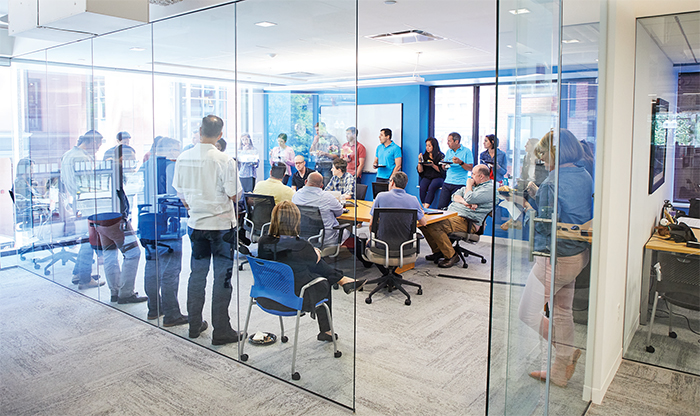
Photo: Pat Piasecki
Gradifi employees gather for team lunches on Wednesdays.
After graduation, DeMello worked as a stockbroker for six years, but his entrepreneurial spirit didn’t fade. He kept a binder full of business ideas, and he dreamed of possibilities. When he left his job, DeMello started Wall Street Games, an interactive investment game. The company later added fantasy sports as well; this was long before the Internet made such activities common. Wall Street Games, later renamed Replica, used a call center to interact with players. The company landed DeMello on the cover of Inc. in 1988. “That was huge,” he says. “It put me on the map.” Other ventures followed. In 1993, he founded Streamline.com, an early e-commerce company. In 2004, he launched Ziggs.com, a social networking site for business professionals. And in 2009, DeMello started Spotlight Media, which provided daily shopping deals.
With Gradifi, DeMello now has started seven businesses, most of which have been sold or gone public. Along the way, he also established Babson’s Founder’s Fund, in which entrepreneurs in the early stages of their ventures pledge a percentage of their future equity to the school. The fund has resulted in more than $3 million in donations.
All this success hasn’t slowed the flow of ideas that DeMello has for possible ventures. In his apartment, he is constantly jotting down thoughts, and he loves the sight of a clean whiteboard, all that space waiting to be filled with purpose and potential. “It’s one of my favorite things in the world,” he says. Whenever he has an idea for a business, he buys the domain name just in case. He owns about 70 of them.

Photo: Pat Piasecki
DeMello talks with daughter Nikki, a communications manager at Gradifi.
“He never goes anywhere without a notebook,” says Nikki DeMello, Tim’s daughter. Growing up, she and her brother, Zac ’18, would visit their father at his various ventures, and now Nikki works as a communications manager at Gradifi. “If we go to the beach,” she says, “he brings a book, a notebook, and a G-2 10 pen.”
Growing Gradifi
Babson may have inspired DeMello, but it also provided him with a network of friends and professionals who have aided and encouraged him through the years. That network is evident in the story of Gradifi. The most significant Babson connection was Jim Herbert ’66, whose bank, First Republic, bought Gradifi late last year (see sidebar), but those College relationships popped up again and again during Gradifi’s formation. DeMello first got the idea for the company in 2013 while listening to a discussion about student loans at a Babson Board of Trustees meeting (DeMello served on the board for nine years). Later, an old rugby buddy who works in real estate, Bill Anderson ’83, found the Boylston Street office for Gradifi, and Steve Connelly ’82 of ad agency Connelly Partners shaped the company’s brand. Additionally, much of the $5 million that DeMello raised from angel investors came from Babson colleagues.
Another rugby friend, Dick Dubois ’82, COO of the assurance practice at PwC, provided Gradifi with a big boost in its early days. The company was looking for a launch site to give its benefit a test run, so DeMello invited Dubois to lunch at the Palm, a steakhouse in Boston’s Financial District, and sketched out his vision for Gradifi on a napkin. “I immediately understood that it was a great strategic fit for my firm,” says Dubois. PwC has an overarching purpose of tackling large societal problems, and student debt is a significant personal issue for many of the company’s 50,000 U.S. employees, given that their average age is 27. Dubois went on to introduce DeMello to Tim Ryan ’88, PwC’s U.S. chairman and senior partner, who also was excited to work with Gradifi.
Having PwC on board was a coup, but now Gradifi had to deliver. When DeMello started talking with PwC in 2014, Gradifi didn’t even have a proper office yet, much less a staff. DeMello had no employees save for future COO Lowenstein, who then was only an adviser, and the two were meeting daily in a cafe in the John Hancock Tower. Ramping up to provide their service to thousands of PwC employees would take hard work. “When you think about a startup, that first client is really critical,” DeMello says. “The pressure was huge. We had to make it work. I knew if we could make it work for PwC, we could make it work for everyone. We took every piece of feedback they gave us.” By summer 2016, PwC was offering loan repayment to all its eligible U.S. employees, and Dubois labeled the benefit a big success, earning goodwill with workers and helping with retention efforts.
Other triumphs have followed for Gradifi, and nowadays the company has 48 employees and is planning to expand its office space. But DeMello admits that achievements in entrepreneurship often come with a cost. In Gradifi’s early years, he was working 70, 80 hours a week. “This is really hard to do. It’s not an easy road. It’s highs and lows and everything in between,” he says. “When things work, it’s amazing. When they don’t, it’s horrible.” Other people in an entrepreneur’s life might not understand all the sacrifice a venture requires. “It’s hard for people around you. There is a reason I’m single,” says DeMello, but then adds, “That’s fine with me. I’m good with it. But it takes its toll.”
That being said, DeMello has no plans to stop. “I’m never going to retire,” he says. “I don’t even know what that means. I really think I could do this for 30 more years.” As proud as he is of Gradifi, he can’t help but look to the future. When asked what his favorite is among the companies he has launched, he says simply, “The next one.”
Want to network with other people in Babson’s global community? The recently launched Babson Connector lets you engage with Babson-founded companies, share ideas for ventures, recruit Babson talent, and more. Sign up at Connector.Babson.edu.
]]>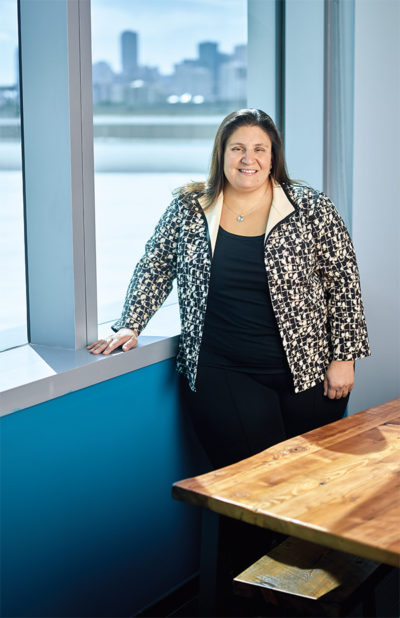
Photo: Jeffery Salter
Nelly Farra, MBA’10, director, WIN Lab, Miami
An entrepreneur herself, Farra is a veteran of three startup companies. In her latest career move, she became director of the Miami outpost of the Women Innovating Now (WIN) Lab, an accelerator designed to help women grow their companies and founded by the Center for Women’s Entrepreneurial Leadership.
The launch of WIN Lab Miami follows on the success of the flagship WIN Lab in Boston, now in its fourth year. “We founded the program to solve a problem that we first saw on Babson’s campus,” says Heatherjean MacNeil, global director of WIN Lab, “which is that there is a lower participation of women in entrepreneurial extracurricular programming.” Women are less likely than men to take advantage of business accelerators, MacNeil says, adding that only 3 percent of venture capital goes to women-run businesses.
Today the Boston program is based in a co-working space at the College’s new downtown High Street campus. “We saw it as critical that we connect our entrepreneurs into Boston’s entrepreneurship ecosystem, which is really robust,” MacNeil says. Launched this fall, WIN Lab Miami will be part of CIC Miami, the most recent expansion site of what was formerly known as the Cambridge Innovation Center. CIC, which originated in Massachusetts, has similar aims of bringing entrepreneurs together in communities.
Nearly 200 women applied for the 22 spots in the Miami program, which is eight months long and tuition free. Those who made the final cut have a clear vision for their businesses yet are open to advice, Farra notes. Local female mentors, recruited by Farra, will coach the WIN Lab entrepreneurs. Participants also will gather once a week to report on the progress of their companies and to discuss various related topics, such as gender bias in fundraising. “We have really honest conversations with our entrepreneurs around how they can be prepared, how they can build the social capital they need, and which investment firms are investing in women,” MacNeil says. WIN Lab also focuses on preparing women for CEO roles, MacNeil says.
When Silvia Camps learned that she was chosen for WIN Lab Miami, she couldn’t wait to start meeting with her cohort. Camps returned to Miami from New York City almost a decade ago and has struggled to find a supportive network of other professional women. She is founder and CEO of Stow Simple, a provider of valet storage services. The company, which is a little more than a year old, has one warehouse filled to capacity, and Camps needs help choosing her next steps. “I have big strategic questions surrounding funding, business structure, expansion, and talent acquisition,” she says.
As a woman entrepreneur, Camps says she already has experienced gender bias, noting that in meetings potential investors typically direct questions to her brother, head of operations at the company, and not to her, even though she is the founder and CEO. Camps found a different atmosphere when talking with the people behind WIN Lab Miami. “I really felt welcome,” she says, “and thought these people are going to give me the time and attention that every entrepreneur deserves.”—Erin O’Donnell
]]>